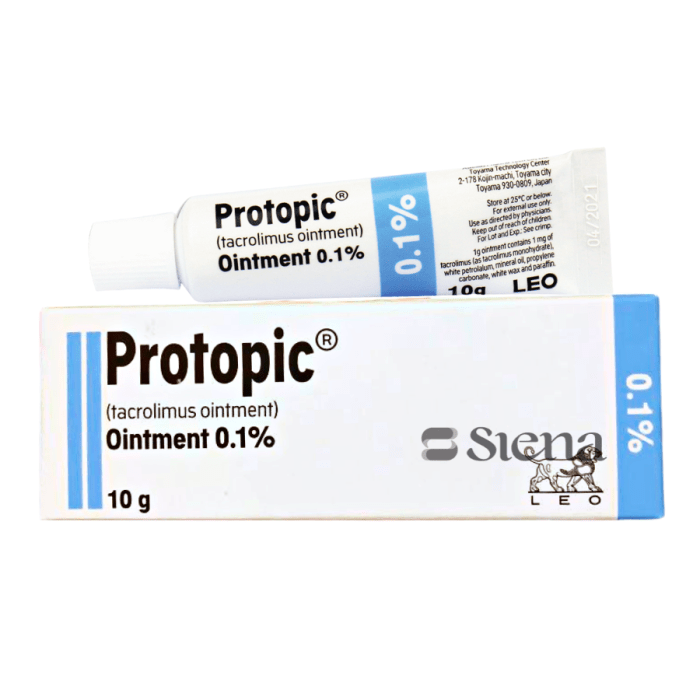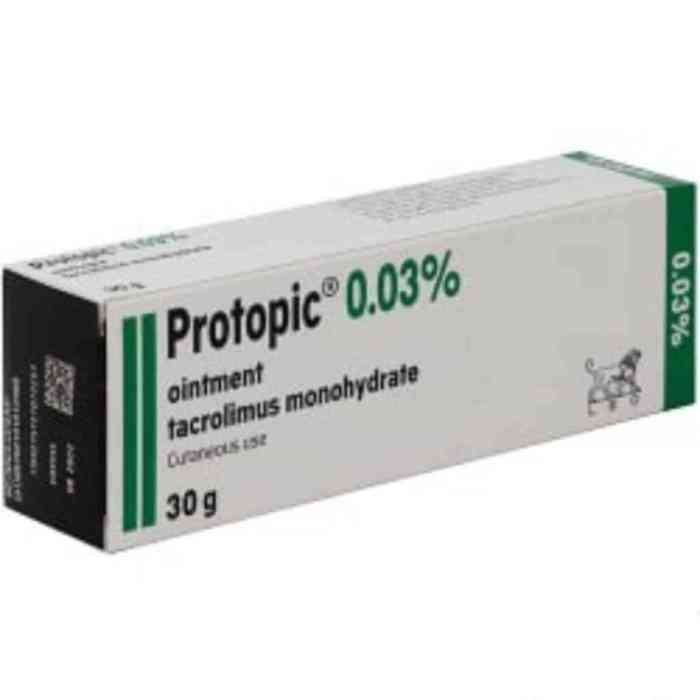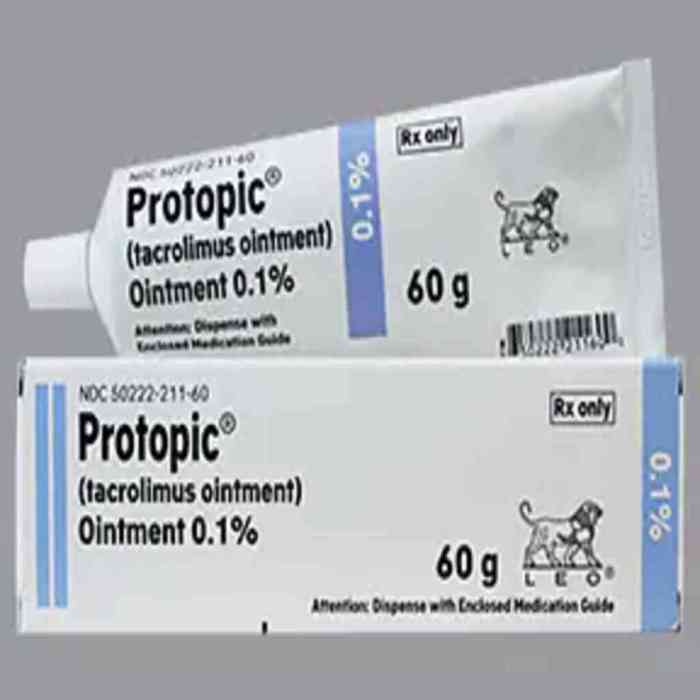Protopic ointment, also known as tacrolimus ointment, is a topical medication prescribed for the treatment of various skin conditions, most notably eczema. It works by modulating the immune response in the skin, reducing inflammation and itching associated with these conditions.
This ointment is available in different strengths and formulations, tailored to the severity of the condition and the patient’s individual needs. Its effectiveness lies in its ability to target specific cells involved in the inflammatory process, offering a targeted approach to managing skin conditions.
Protopic Ointment
Protopic Ointment, also known as tacrolimus ointment, is a topical medication prescribed for the treatment of certain skin conditions. It is a potent immunosuppressant that works by suppressing the immune system’s response in the skin.
Active Ingredient and Mechanism of Action
The active ingredient in Protopic Ointment is tacrolimus, a macrolide antibiotic. Tacrolimus is a calcineurin inhibitor, meaning it blocks the activity of an enzyme called calcineurin. Calcineurin plays a crucial role in the activation of T cells, which are a type of white blood cell involved in the immune response. By inhibiting calcineurin, tacrolimus prevents the activation and proliferation of T cells, reducing inflammation and the symptoms of skin conditions.
Conditions Treated
Protopic Ointment is typically prescribed for the treatment of:
* Atopic dermatitis (eczema): A chronic skin condition characterized by itchy, red, and inflamed patches of skin.
* Psoriasis: A chronic skin condition characterized by thick, scaly patches of skin.
Strengths and Formulations
Protopic Ointment is available in two strengths:
* 0.03%: This strength is typically used for mild to moderate cases of atopic dermatitis and psoriasis.
* 0.1%: This strength is typically used for moderate to severe cases of atopic dermatitis and psoriasis.
Protopic Ointment is available in two formulations:
* Ointment: This formulation is a thick, greasy cream that is applied to the skin.
* Cream: This formulation is a thinner, lighter cream that is applied to the skin.
How Protopic Ointment Works
Protopic Ointment is a topical medication used to treat eczema, a common skin condition that causes inflammation, itching, and dryness. To understand how Protopic Ointment works, it’s essential to grasp the role of the immune system in skin conditions like eczema.
The Immune System and Eczema
Eczema occurs when the immune system overreacts to certain triggers, leading to inflammation in the skin. The immune system is a complex network of cells and organs that protect the body from harmful invaders like bacteria, viruses, and fungi. In eczema, the immune system mistakenly identifies harmless substances as threats, triggering an inflammatory response. This response involves the release of chemicals called cytokines, which cause the characteristic symptoms of eczema, including redness, swelling, itching, and dryness.
Protopic Ointment’s Modulation of the Immune Response
Protopic Ointment, also known as tacrolimus ointment, works by modulating the immune response in the skin. It selectively inhibits the production of certain cytokines, particularly those involved in the inflammatory cascade of eczema. By suppressing the production of these inflammatory mediators, Protopic Ointment helps reduce the redness, itching, and inflammation associated with eczema.
Cellular Targets of Protopic Ointment
Protopic Ointment primarily targets T lymphocytes, a type of white blood cell that plays a crucial role in the immune response. Specifically, it inhibits the activity of calcineurin, an enzyme essential for the activation of T lymphocytes. Calcineurin is involved in the signaling pathway that leads to the production of inflammatory cytokines. By inhibiting calcineurin, Protopic Ointment prevents the activation of T lymphocytes and reduces the production of inflammatory mediators.
Applying Protopic Ointment
Applying Protopic Ointment correctly is essential for maximizing its effectiveness and minimizing potential side effects. Here’s a guide to help you use it properly.
How to Apply Protopic Ointment
Applying Protopic Ointment is straightforward.
- Wash your hands thoroughly with soap and water before and after applying the ointment.
- Apply a thin layer of Protopic Ointment to the affected areas of your skin, gently rubbing it in until it is fully absorbed.
- Avoid applying the ointment to broken skin, open wounds, or mucous membranes.
- After applying the ointment, wash your hands again.
Minimizing Side Effects
Protopic Ointment is generally well-tolerated, but some side effects can occur.
- To minimize the risk of side effects, use the ointment only as directed by your doctor.
- Avoid applying Protopic Ointment to large areas of skin, as this increases the risk of side effects.
- If you experience any unusual side effects, stop using the ointment and contact your doctor immediately.
Frequency and Duration of Treatment
The frequency and duration of treatment with Protopic Ointment will vary depending on the severity of your condition and your individual response to the medication.
- Your doctor will determine the appropriate frequency and duration of treatment for you.
- Typically, Protopic Ointment is applied twice daily for a few weeks to a few months, depending on the severity of your condition.
- It is important to follow your doctor’s instructions carefully and not stop using the ointment prematurely, even if you feel better.
Benefits of Protopic Ointment
Protopic Ointment, also known as tacrolimus ointment, offers a range of benefits for individuals struggling with various skin conditions, particularly eczema. Its effectiveness in treating these conditions stems from its unique mechanism of action, which helps to reduce inflammation and restore the skin’s natural barrier function. This ointment has proven to be a valuable tool in managing both acute and chronic skin conditions, offering relief from symptoms and improving overall skin health.
Effectiveness in Treating Eczema
Protopic Ointment is highly effective in treating eczema, a common skin condition characterized by itchy, inflamed, and sometimes weeping skin. It works by inhibiting the production of inflammatory chemicals in the skin, reducing the redness, itching, and scaling associated with eczema. Studies have shown that Protopic Ointment can significantly improve eczema symptoms, leading to a reduction in the frequency and severity of flare-ups.
Comparison to Other Topical Treatments
Protopic Ointment is often compared to other topical treatments for eczema, such as corticosteroids. While corticosteroids can also be effective in reducing inflammation, they can have potential side effects, including skin thinning and the development of stretch marks. Protopic Ointment, on the other hand, has a lower risk of these side effects, making it a preferred option for long-term use. Additionally, Protopic Ointment is generally considered safe for use in children, while corticosteroids are often restricted in younger patients due to their potential side effects.
Long-Term Benefits for Chronic Skin Conditions
For individuals with chronic skin conditions like eczema, Protopic Ointment can provide long-term benefits by helping to manage symptoms and improve overall skin health. By reducing inflammation and restoring the skin’s natural barrier function, Protopic Ointment can help to prevent flare-ups and improve the quality of life for patients with chronic skin conditions. Regular use of Protopic Ointment can help to reduce the need for other treatments, such as oral corticosteroids, which can have more significant side effects.
Potential Side Effects

Protopic Ointment, like any medication, can cause side effects. Most side effects are mild and temporary, but some can be more serious. It’s important to be aware of the potential side effects and to talk to your doctor if you experience any concerns.
Common Side Effects
Common side effects of Protopic Ointment include:
- Burning
- Stinging
- Redness
- Dryness
- Itching
These side effects are usually mild and tend to go away on their own within a few days. If you experience any of these side effects, you can try applying a cool compress or using a moisturizer to soothe the area.
Less Common Side Effects
Less common side effects of Protopic Ointment include:
- Acne
- Folliculitis (inflammation of hair follicles)
- Skin infections
- Skin thinning
- Skin discoloration
These side effects are usually mild and tend to go away on their own within a few days. If you experience any of these side effects, talk to your doctor.
Serious Side Effects
Serious side effects of Protopic Ointment are rare but can occur. If you experience any of the following side effects, stop using Protopic Ointment and seek medical attention immediately:
- Severe skin reactions, such as blistering, peeling, or oozing
- Swelling of the face, lips, tongue, or throat
- Difficulty breathing
- Fever
- Chills
It’s important to note that this is not an exhaustive list of all possible side effects. If you experience any side effects that are concerning, talk to your doctor.
Safety Considerations

Protopic Ointment is generally considered safe for most people when used as directed. However, like any medication, there are certain safety considerations to keep in mind, particularly for specific populations and when considering potential drug interactions.
Safety in Children
Protopic Ointment is approved for use in children as young as 2 years old for the treatment of atopic dermatitis. However, it’s crucial to discuss the risks and benefits with your child’s doctor before starting treatment.
- Children are more susceptible to side effects, such as skin irritation, burning, and stinging.
- Long-term use in children may increase the risk of skin cancer, though the evidence is still limited.
Safety in Pregnant and Breastfeeding Women
There is limited information about the safety of Protopic Ointment during pregnancy and breastfeeding.
- While studies haven’t shown a direct risk to the fetus, it’s important to weigh the potential benefits against the potential risks.
- Protopic Ointment is not recommended for use during pregnancy unless the potential benefits outweigh the risks.
- It’s also important to discuss with your doctor whether it’s safe to use Protopic Ointment while breastfeeding.
Potential Drug Interactions
While Protopic Ointment is generally not known to interact with other medications, it’s essential to inform your doctor about all medications you’re currently taking, including over-the-counter medications, supplements, and herbal remedies.
- Certain medications may affect how Protopic Ointment works or increase the risk of side effects.
- Your doctor can advise you on any potential drug interactions and adjust your treatment plan as needed.
Importance of Consulting a Healthcare Professional
It’s always best to consult with a healthcare professional before using Protopic Ointment, especially if you have any underlying medical conditions, are pregnant or breastfeeding, or are taking other medications. They can assess your individual needs and determine if Protopic Ointment is right for you.
Protopic Ointment and Lifestyle Factors
While Protopic Ointment is effective in managing eczema, lifestyle factors play a significant role in its overall effectiveness and maintaining skin health.
Diet and Skin Health
A balanced diet rich in fruits, vegetables, and whole grains can support overall skin health, including reducing inflammation and promoting skin repair.
- Foods rich in omega-3 fatty acids, like salmon, flaxseed, and walnuts, can help reduce inflammation and improve skin barrier function.
- Antioxidant-rich foods, such as berries, leafy greens, and citrus fruits, can protect the skin from damage caused by free radicals.
- Foods high in vitamin C, like oranges, peppers, and broccoli, are essential for collagen production, which supports skin elasticity and wound healing.
Stress Management
Stress can exacerbate eczema symptoms and hinder the effectiveness of Protopic Ointment.
- Stress management techniques like deep breathing exercises, meditation, and yoga can help reduce stress levels and improve skin health.
- Regular physical activity can release endorphins, which have mood-boosting effects and can help manage stress.
- Getting enough sleep is crucial for stress management and overall well-being, promoting skin repair and reducing inflammation.
Environmental Exposure
Environmental factors can trigger eczema flare-ups and affect the effectiveness of Protopic Ointment.
- Avoid harsh soaps and detergents, as they can irritate the skin and worsen eczema symptoms.
- Use a humidifier to add moisture to the air, especially during dry winter months, as dry air can exacerbate eczema.
- Identify and avoid potential allergens, such as dust mites, pollen, and pet dander, that can trigger eczema flare-ups.
Sun Protection
Protopic Ointment can increase skin sensitivity to sunlight, making sun protection essential.
- Always wear sunscreen with an SPF of 30 or higher, even on cloudy days.
- Avoid prolonged sun exposure, especially during peak hours (10 am to 4 pm).
- Wear protective clothing, such as long sleeves and a hat, to minimize sun exposure.
Protopic Ointment
Protopic Ointment, also known as tacrolimus ointment, is a topical medication prescribed for the treatment of eczema (atopic dermatitis). It is a potent immunosuppressant that helps to reduce inflammation and itching associated with this chronic skin condition.
Long-Term Safety and Efficacy
Protopic Ointment has been studied extensively for its long-term safety and efficacy in managing chronic eczema. Studies have shown that Protopic Ointment can be used safely and effectively for extended periods. It is generally well-tolerated, and long-term use does not appear to increase the risk of serious side effects.
Protopic Ointment has been approved by the FDA for long-term use in adults and children over the age of 2 years.
Protopic Ointment in Managing Chronic Skin Conditions
Protopic Ointment is a valuable tool in managing chronic eczema. It helps to control the symptoms of eczema, such as itching, redness, and inflammation. By reducing inflammation, Protopic Ointment can help to improve the quality of life for people with eczema.
Protopic Ointment is often used as a maintenance therapy to prevent flare-ups of eczema.
Regular Follow-Up with a Healthcare Professional, Protopic ointment
Regular follow-up with a healthcare professional is essential for long-term management of eczema with Protopic Ointment. This allows your doctor to monitor your condition and adjust your treatment plan as needed.
It is important to report any changes in your skin condition or any side effects you experience to your healthcare provider.
Alternatives to Protopic Ointment

Protopic Ointment is a potent topical medication used to treat eczema, but it’s not the only option available. Several other treatments can effectively manage eczema and other skin conditions, each with its own set of advantages and disadvantages. Understanding these alternatives can help you make an informed decision about the best treatment for your specific needs.
Comparison of Topical Treatments
This section will compare and contrast Protopic Ointment with other topical treatments for eczema and other skin conditions. We will discuss the pros and cons of each treatment and provide information on when alternative treatments may be more appropriate.
Topical Corticosteroids
Topical corticosteroids are the most commonly prescribed treatment for eczema. They work by reducing inflammation and itching. There are many different strengths of topical corticosteroids available, and your doctor will prescribe the appropriate strength for your condition.
- Pros: Topical corticosteroids are generally effective in reducing inflammation and itching. They are available in a variety of formulations, including creams, ointments, lotions, and sprays. They are generally safe for short-term use.
- Cons: Long-term use of topical corticosteroids can lead to side effects, such as skin thinning, stretch marks, and acne. They can also suppress the immune system, making you more susceptible to infections.
- When to Consider: Topical corticosteroids are a good option for short-term treatment of eczema flares. They may also be appropriate for long-term use if the benefits outweigh the risks.
Calcineurin Inhibitors
Calcineurin inhibitors, such as Protopic Ointment and Elidel Cream, are another type of topical medication used to treat eczema. They work by suppressing the immune system in the skin, reducing inflammation and itching.
- Pros: Calcineurin inhibitors are generally effective in treating eczema, and they are less likely to cause skin thinning than topical corticosteroids. They are also available in a variety of formulations.
- Cons: Calcineurin inhibitors can increase the risk of skin cancer, particularly with long-term use. They may also cause burning, stinging, or redness.
- When to Consider: Calcineurin inhibitors are a good option for people with eczema who have not responded well to topical corticosteroids or who are concerned about the side effects of long-term corticosteroid use.
Other Topical Treatments
Several other topical treatments are available for eczema, including:
- Antihistamines: Antihistamines can help reduce itching. They are available in both oral and topical formulations.
- Moisturizers: Moisturizers help keep the skin hydrated, which can help prevent eczema flares. It is important to use a moisturizer that is fragrance-free and hypoallergenic.
- Antibiotics: Antibiotics may be prescribed if the eczema is infected.
- Phototherapy: Phototherapy involves exposing the skin to ultraviolet light. It can be effective in treating eczema, but it can also increase the risk of skin cancer.
Protopic ointment can be a valuable tool for managing skin conditions like eczema, offering relief from symptoms and improving quality of life. However, it’s crucial to consult a healthcare professional before using it, as they can determine the appropriate strength and dosage for your specific needs. Remember to follow their instructions carefully and be aware of potential side effects. While Protopic ointment can be an effective long-term treatment option, it’s important to maintain healthy lifestyle habits to support skin health and manage your condition effectively.
Protopic ointment is a topical medication used to treat eczema, a condition that causes itchy, red, and inflamed skin. It’s important to note that while Protopic is generally safe and effective, it’s crucial to be aware of potential side effects. For instance, some medications like Prozac, an antidepressant, can have side effects that might impact your overall health. It’s always best to discuss any concerns with your doctor, especially if you’re considering using Protopic ointment or other medications, and to carefully review the potential side effects of any prescribed medication, such as those associated with Prozac, which you can learn more about here.
Understanding potential side effects is key to making informed decisions about your health and treatment plan.